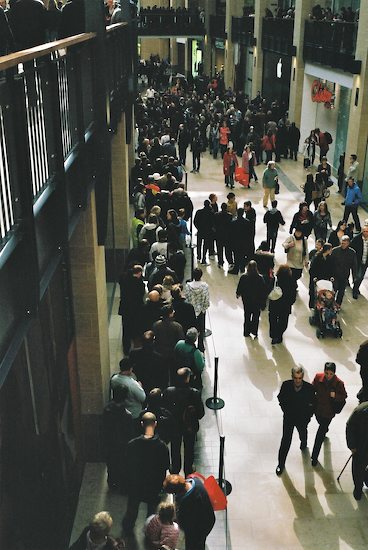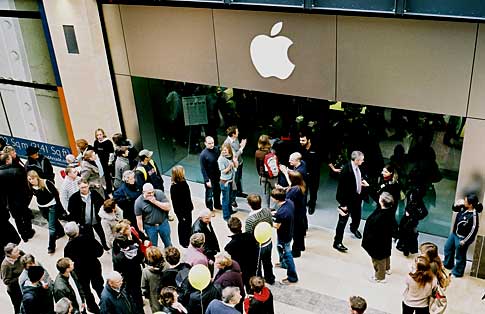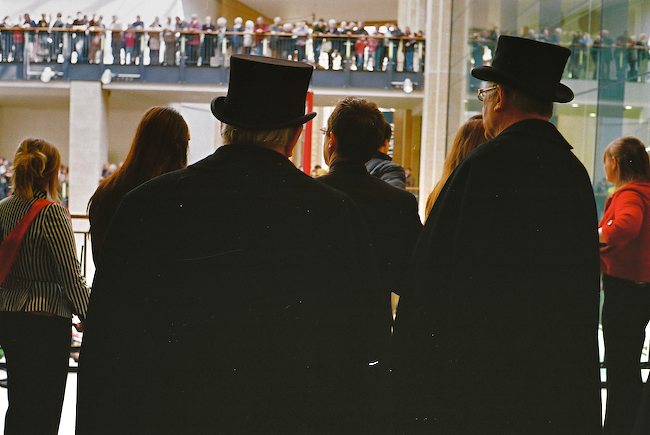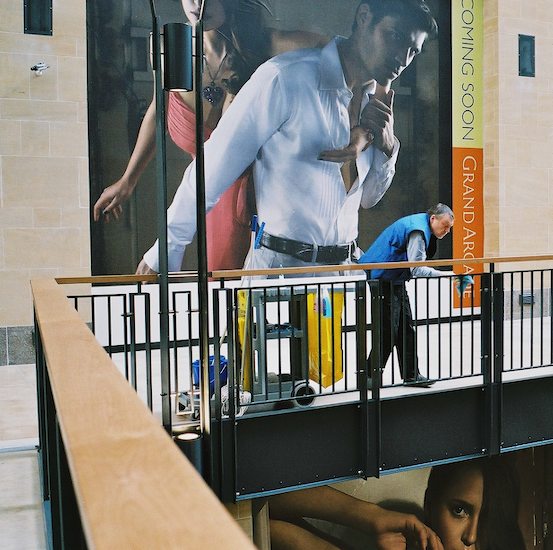
‘Grand’ Arcade this morning. Note long, orderly queue up left hand side. What are they waiting for?
(Hint: See top right of the picture.)
Aw, ok. See below.



‘Grand’ Arcade this morning. Note long, orderly queue up left hand side. What are they waiting for?
(Hint: See top right of the picture.)
Aw, ok. See below.


At the opening of the ‘Grand’ Arcade. My guess is that these dudes are outriders (or even postillions?) for Cambridge’s Lord Mayor.

Cambridge’s ludicrous new shopping mall — pretentiously entitled ‘Grand Arcade’, if you please — opened today. The flip side was also on display, meticulously polishing the fixtures and fittings.
From Engadget
It’s only taken about a million years, but someone has finally decided that improvements are possible in automobile braking lights. Students from Virginia Tech have developed a new system that can show not just whether you’re stopping, but if you’re slowing down, when you’re about to stop, and how quickly you’re pressing the pedal. The concept uses an array of horizontally arranged LED lights — when you begin to slow, lights in the center glow orange, after a certain threshold side lights turn to red, and if you’re slamming on the brake, they’ll all flash red. The team, led by mechanical engineering Professor Mehdi Ahmadian, has plans for the system beyond the lab, though they speculate that it will be easier to add them as additional indicators on commercial vehicles at first. If this pans out, someday soon we may all be tailgating a totally psychedelic light show.
Hmmm…. Someone has commented pointing out that BMW offer ‘Adaptive Brake Lights’ as an optional extra:
“Bumper-to-bumper collisions most often occur when the driver behind you didn’t realize how hard you were braking. Our Adaptive Brake Lights help eliminate that scenario by emitting a larger, brighter light the more force you use. It allows those behind you to clearly see whether you”re lightly tapping the brakes to slow down or applying full force for a sudden stop.”
From his NYT column…
Nobody expects an investment bank to be a charitable institution, but Bear has a particularly nasty reputation. As Gretchen Morgenson of The New York Times reminds us, Bear “has often operated in the gray areas of Wall Street and with an aggressive, brass-knuckles approach.”
Bear was a major promoter of the most questionable subprime lenders. It lured customers into two of its own hedge funds that were among the first to go bust in the current crisis. And it’s a bad financial citizen: the last time the Fed tried to contain a financial crisis, after the collapse of Long-Term Capital Management in 1998, Bear refused to participate in the rescue operation.
Bear, in other words, deserved to be allowed to fail — both on the merits and to teach Wall Street not to expect someone else to clean up its messes.
But the Fed rode to Bear’s rescue anyway, fearing that the collapse of a major investment bank would cause panic in the markets and wreak havoc with the wider economy. Fed officials knew that they were doing a bad thing, but believed that the alternative would be even worse.
As Bear goes, so will go the rest of the financial system. And if history is any guide, the coming taxpayer-financed bailout will end up costing a lot of money.
The U.S. savings and loan crisis of the 1980s ended up costing taxpayers 3.2 percent of G.D.P., the equivalent of $450 billion today. Some estimates put the fiscal cost of Japan’s post-bubble cleanup at more than 20 percent of G.D.P. — the equivalent of $3 trillion for the United States.
If these numbers shock you, they should. But the big bailout is coming. The only question is how well it will be managed.
As I said, the important thing is to bail out the system, not the people who got us into this mess. That means cleaning out the shareholders in failed institutions, making bondholders take a haircut, and canceling the stock options of executives who got rich playing heads I win, tails you lose.
Couldn’t have put it better myself. But will it happen? Don’t hold your breath.
And another thing… The Reagan era savings-and-loan scandal mentioned by Krugman went largely unexposed by the fearless American media. Just as the sub-prime scandal did — until it became unmissable. I went to a fascinating dinner in London about two years ago in which the great Mark Anderson did one of his famous tours d’horizon. He went on and on about the “coming sub-prime crisis” and I began to feel embarrassed because I’d never heard the phrase until that moment. And I’m a pretty assiduous reader of newspapers — American as well as European.
“Likely to encounter issues for which there is no resolution.”
From Adobe’s summary of software that won’t run under Mac OS X 10.5 (Leopard).
Translation: You’re screwed, sucker. Buy an upgrade.
If they’d said something like: “Look, this is old software and we can’t afford to keep every release we’ve ever issued up to date”, then that would have been fine. It’s the impersonal “issues for which there is no resolution” that bugs me.